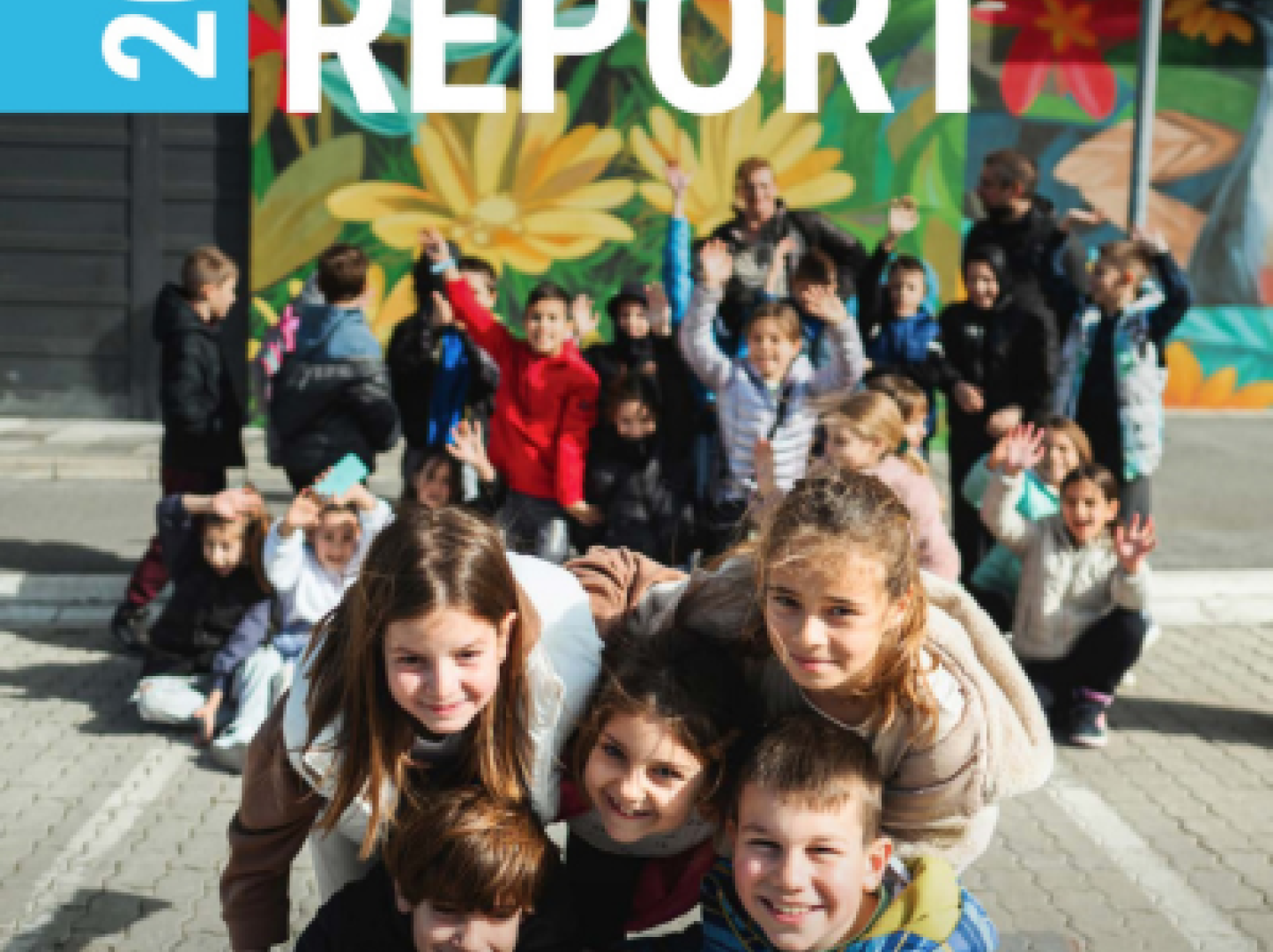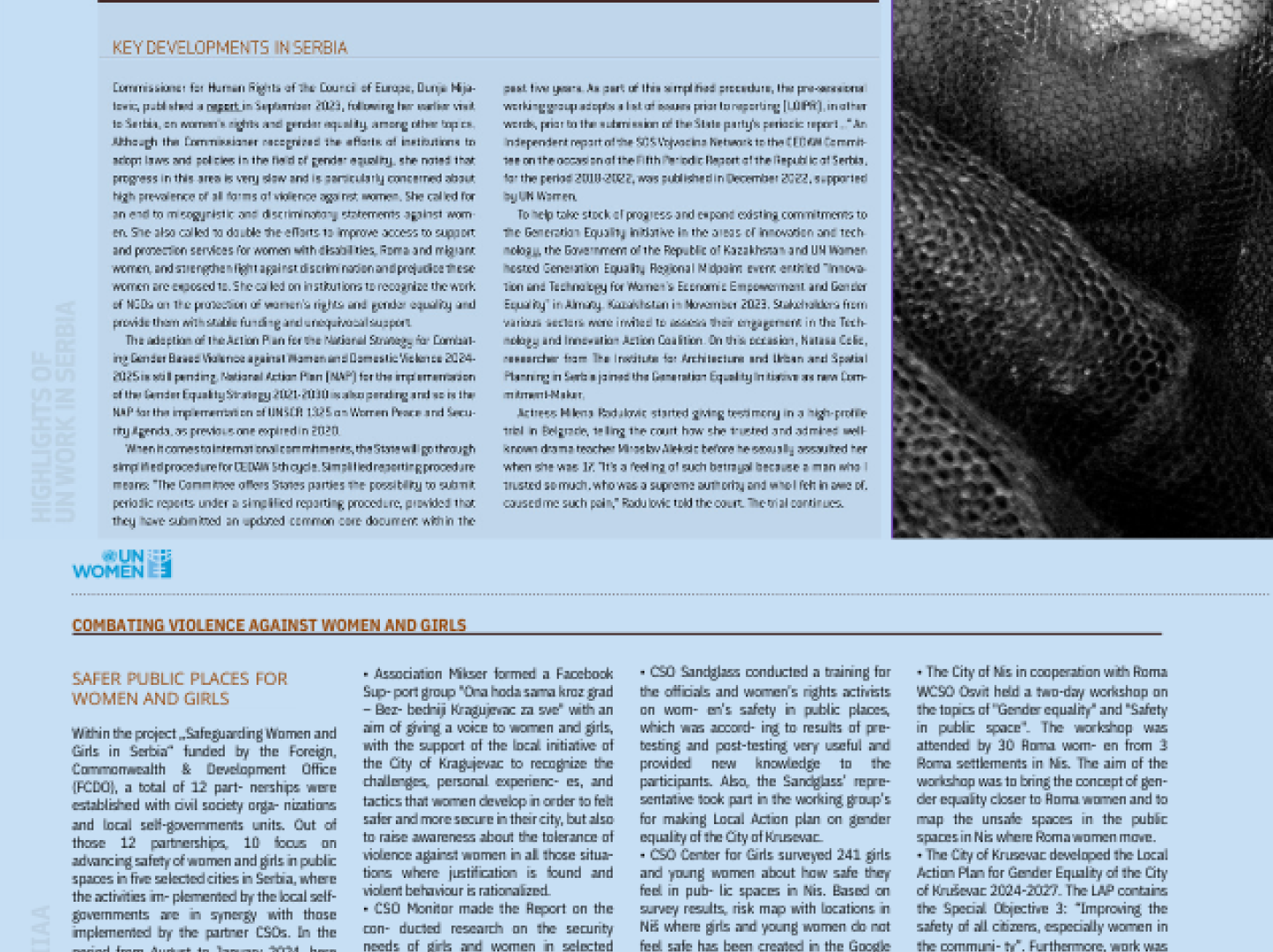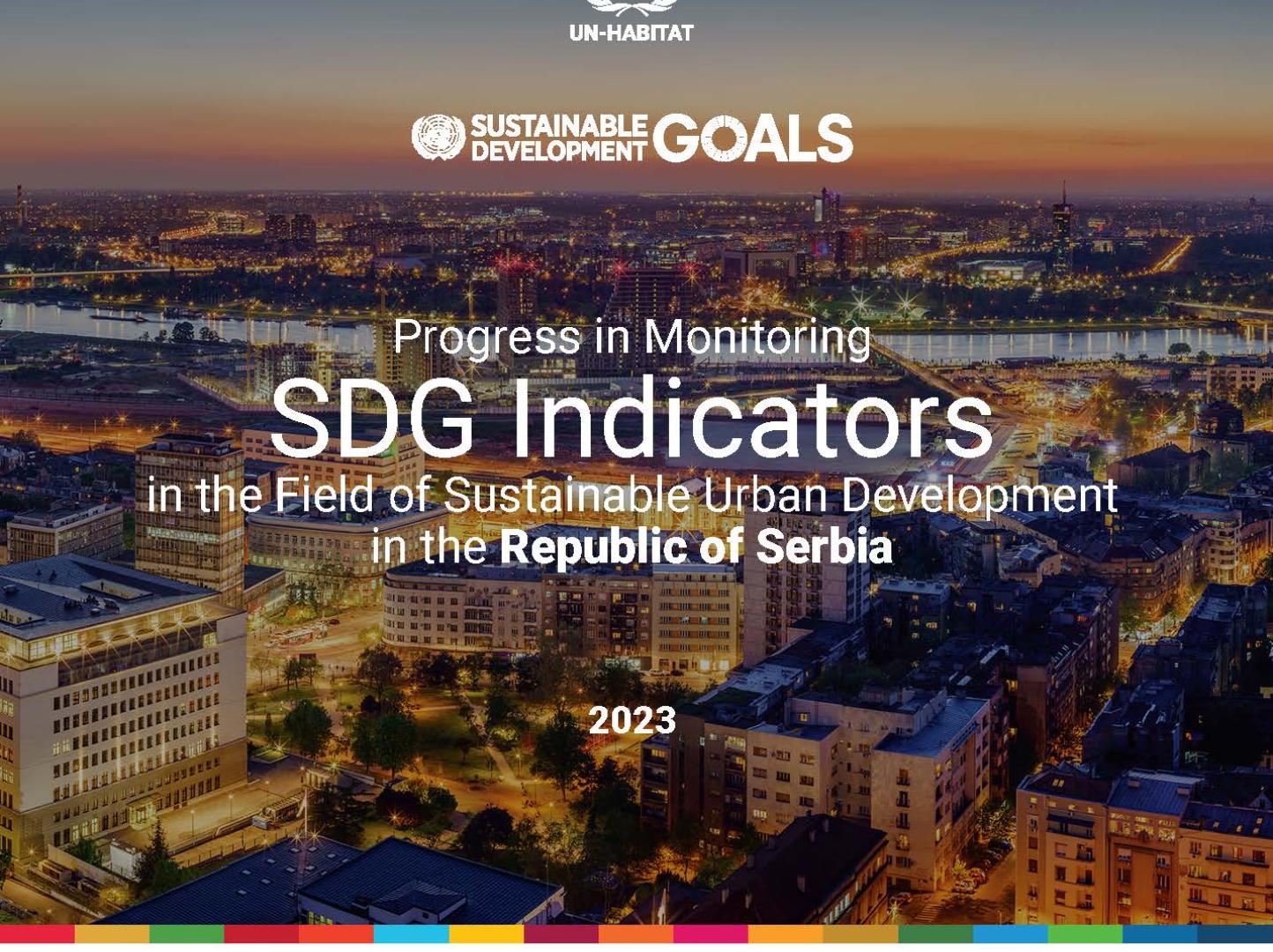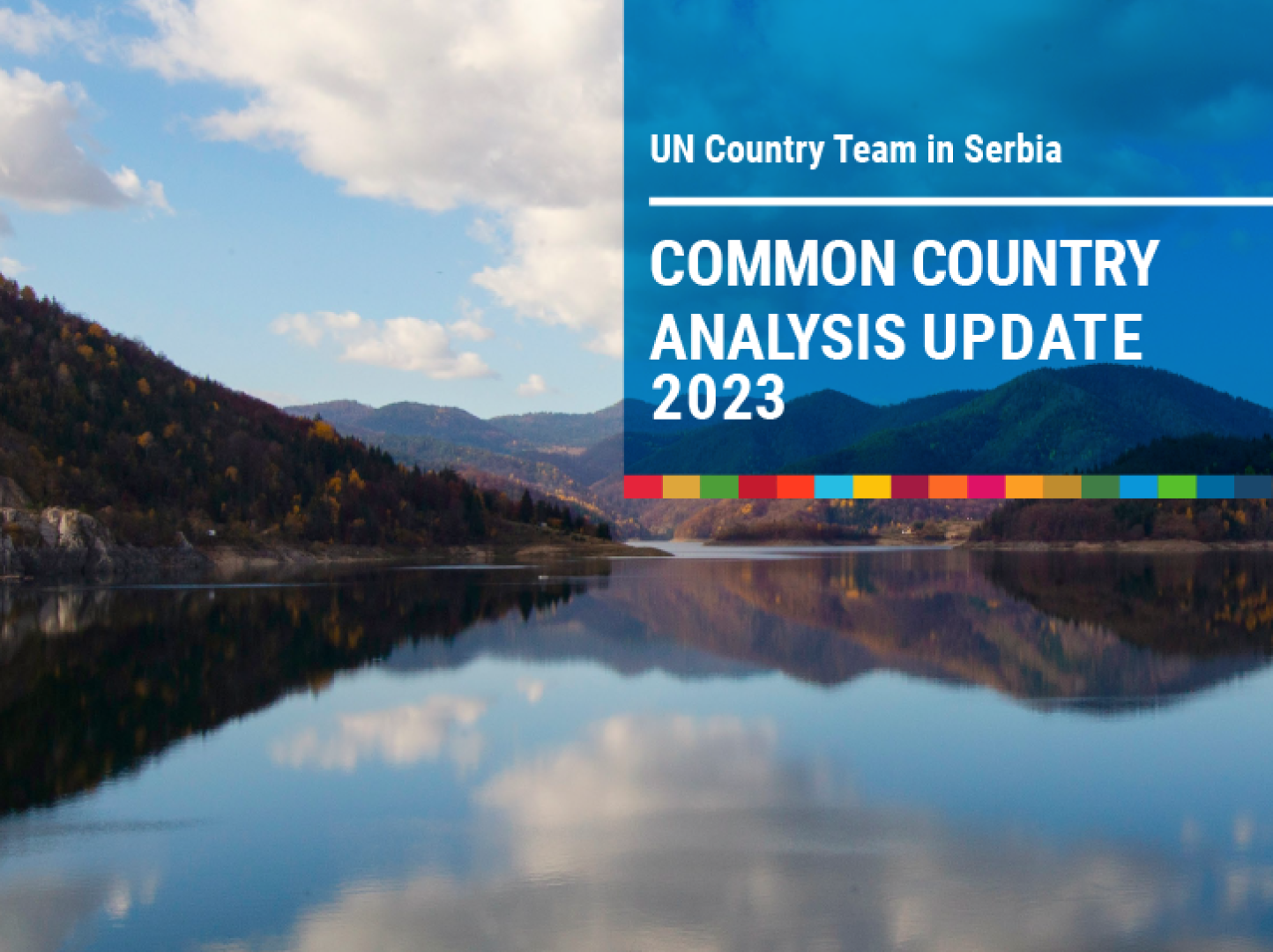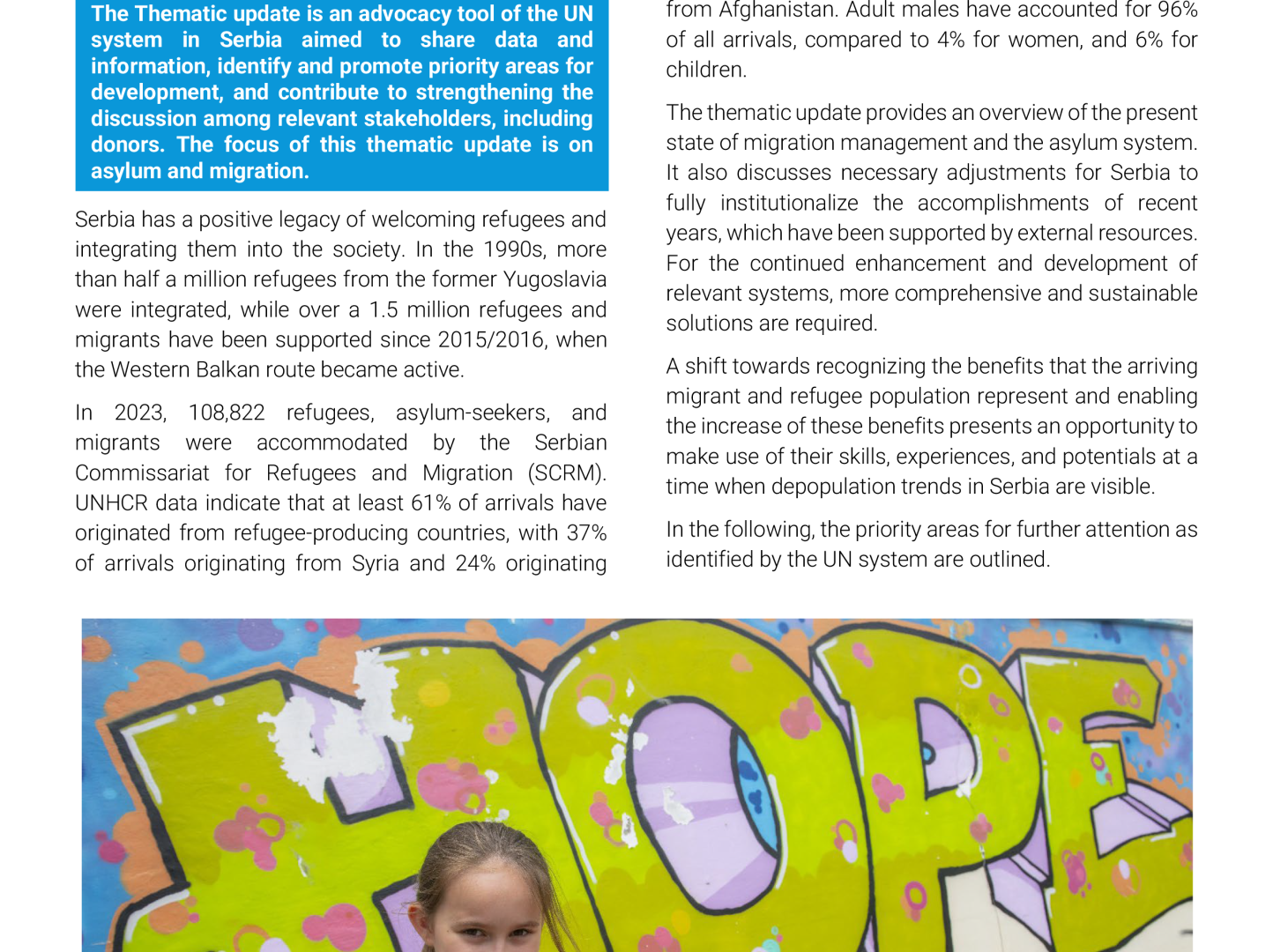Latest
Story
18 September 2025
Global traveling exhibition The Tolerance Project returns to Belgrade with a new edition
Learn more
Press Release
01 September 2025
UN: Joint programme “From Seed to Sustainability: Food Systems 4 All” completed
Learn more
Story
09 August 2025
#bodyright in High Schools: Youth Building Safer Online Spaces
Learn more
Latest
The Sustainable Development Goals in Serbia
The Sustainable Development Goals are a global call to action to end poverty, protect the earth’s environment and climate, and ensure that people everywhere can enjoy peace and prosperity. These are the goals the UN is working on in Serbia:
Story
18 June 2024
Matilde Mordt Assumes Role as New UN Resident Coordinator in Serbia
Belgrade, June 17, 2024 – Matilde Mordt has officially assumed her duties as the new United Nations Resident Coordinator in Serbia following a credentials presentation to the Minister of Foreign Affairs, Marko Đurić which marks the beginning of her role in enhancing the collaboration between Serbia and the United Nations.With more than three decades of experience, Ms. Mordt brings extensive knowledge in the areas of the 2030 Agenda for Sustainable Development, environment and climate change, governance, social policy, and disaster risk reduction. Her previous positions include serving as the UN Development Programme (UNDP) Resident Representative in Ecuador, and various leadership roles within the UNDP in Nicaragua, Paraguay, Argentina, and at the regional hub for Latin America and the Caribbean in Panama. She has also been involved in research and teaching on sustainable development and climate change.Ms. Mordt holds a PhD in Human and Economic Geography with a specialization in livelihoods and sustainability, a master’s degree in international economics and business administration, and a Bachelor’s in social studies from the University of Gothenburg, Sweden. Her appointment is expected to further strengthen the ongoing cooperation and development efforts between Serbia and the United Nations.
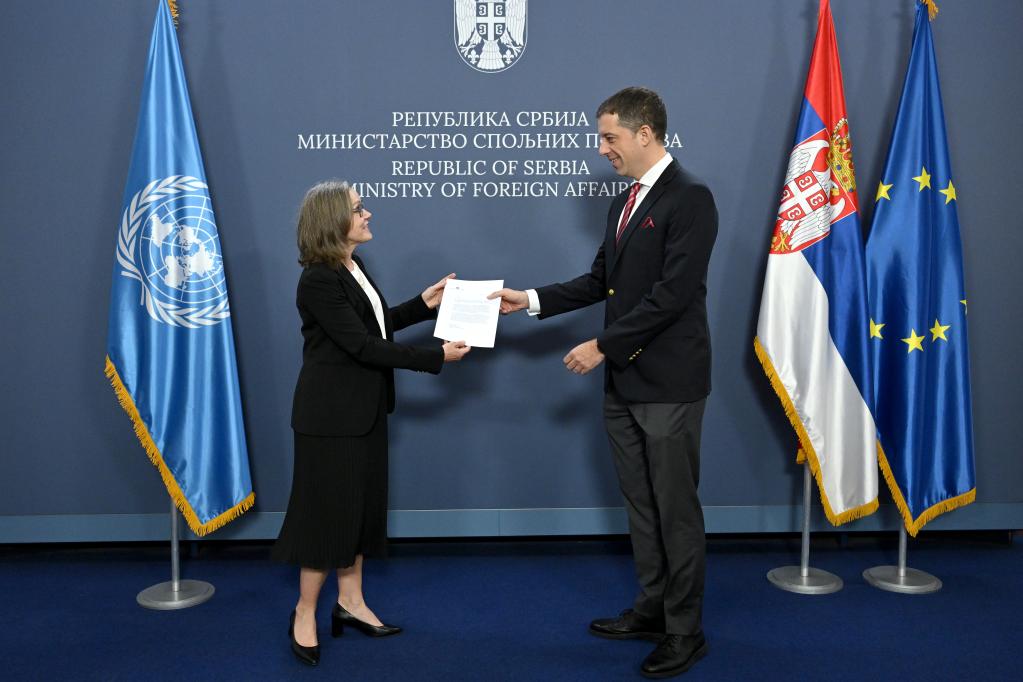
Story
18 September 2025
Global traveling exhibition The Tolerance Project returns to Belgrade with a new edition
Belgrade, 18 September 2025 – The United Nations in Serbia and the Council of Europe Office in Belgrade today opened The Tolerance Project – A Traveling Poster Show at Kalemegdan Fortress, Sava Promenade. This latest Belgrade edition brings a selection of newly added works from the global initiative founded and curated by designer Mirko Ilić, which has already showcased the creativity of more than 200 artists from over 40 countries and international works from all continents.Over the years, The Tolerance Project has been presented in Belgrade alongside exhibitions in cities such as New York, Madrid, Tokyo, and Johannesburg. The 2025 edition includes fresh contributions from Serbian designers Slavimir Stojanović, Marko Vuleta, Borut Vild, Dušan Petričić, Stefan Gajić, and others, placing local talent next to international works that confront prejudice and invite reflection through the universal language of design.As part of the broader Tolerance Campaign (Kampanja „Tolerancija“) – a joint initiative of the United Nations and the Council of Europe launched earlier this year to promote inclusion and counter hate speech – the exhibition underscores efforts to use art, education, and public engagement to challenge prejudice and strengthen solidarity.Opening the show, Matilde Mordt, UN Resident Coordinator in Serbia, underlined the urgency of the theme:
“Tolerance is not passive acceptance, it is an active choice. At a time when divisions are visible across societies, these posters are a reminder that respect, empathy, and fairness are the foundations that hold communities together.”Janos Babity, Head of the Council of Europe Office in Belgrade, said:
“This exhibition is a call for all of us to say NO to prejudice, and YES to inclusion. Every step in that direction contributes to building a community that is rich in its diversity and united in solidarity.”Speaking at the opening, Professor Borut Vild, one of the contributing Serbian designers, said:
“We can dedicate this exhibition to the visual messages that in recent months have so strongly shaped the public space — a kind of vernacular design born out of people’s need to express their feelings and views. Out of the same impulse came the works of these authors: the need to respond to injustice, violence, exclusion, and hatred. In that sense, design is our mother tongue.”The exhibition will remain open until the end of September on the Sava promenade of Kalemegdan Fortress, overlooking the confluence of the Sava and Danube rivers. Admission is free.
“Tolerance is not passive acceptance, it is an active choice. At a time when divisions are visible across societies, these posters are a reminder that respect, empathy, and fairness are the foundations that hold communities together.”Janos Babity, Head of the Council of Europe Office in Belgrade, said:
“This exhibition is a call for all of us to say NO to prejudice, and YES to inclusion. Every step in that direction contributes to building a community that is rich in its diversity and united in solidarity.”Speaking at the opening, Professor Borut Vild, one of the contributing Serbian designers, said:
“We can dedicate this exhibition to the visual messages that in recent months have so strongly shaped the public space — a kind of vernacular design born out of people’s need to express their feelings and views. Out of the same impulse came the works of these authors: the need to respond to injustice, violence, exclusion, and hatred. In that sense, design is our mother tongue.”The exhibition will remain open until the end of September on the Sava promenade of Kalemegdan Fortress, overlooking the confluence of the Sava and Danube rivers. Admission is free.
1 of 5

Story
09 August 2025
#bodyright in High Schools: Youth Building Safer Online Spaces
In a world where digital communication, consciously or unconsciously, can cause harm, and phone and computer screens become a place of various challenges, a new energy is emerging in high schools across Serbia – one that brings understanding, empathy, and support. Under the umbrella of the #bodyright campaign, high school students in Belgrade, Inđija, and Požarevac are learning how to confront a 21st-century challenge that knows no borders: technology-facilitated gender-based violence.Workshops, implemented earlier this year by the UN Population Fund (UNFPA) as part of the joint project "Ending Violence- Empowering Change" and in cooperation with the Commissioner for the Protection of Equality, are conveying an important message to young people: just as copyright protects creative content, our bodies and images deserve protection in the online space.In the "Đorđe Natošević" High School in Inđija, around 20 students participated in a session that examined the mechanisms, consequences, and emotional impact of digital violence. Through guided exercises and peer-to-peer discussions, students explored not only what victims experience, but also how the choices of friends, classmates, and the school itself can further deepen trauma – or help stop it.In Požarevac, the workshop went even deeper – it opened with an ethical dilemma: If your friend records someone without consent and threatens to publish the recording, will you react? Through a powerful "yes" or "no" chair exercise, students physically took a stand – and then had to explain why. Friendship. Fear. Justice. Betrayal. Their answers encompassed a full spectrum of emotions, but all pointed to the same truth: technology-facilitated gender-based violence is not just a digital problem – its consequences are felt in the real world.In Belgrade, students analyzed concepts such as doxing, upskirting, and the thin line between consensual and abusive sexting. They learned to distinguish between explaining behavior and justifying it. This subtle but crucial understanding formed the basis for the next task: putting themselves in the position of a peer facing public shaming after online violence.Divided into small groups, students considered what that person might hear at school – whispers, laughter, silence. What they might feel – fear, anger, shame. And what they would need – empathy, protection, someone who simply believes them.The workshops further emphasized the importance of platforms such as "Smart and Safe" and "I Protect You," as well as the existence of a free support line for children – resources that many students may not even know exist. Participants discussed how a victim feels upon returning to school after experiencing online violence. Some imagined whispers in the hallways or mocking glances. Others recognized how powerful it is to stand by someone, instead of watching them be excluded.The #bodyright campaign is not just a slogan – it is changing the way we relate to each other in the digital age. In Serbia, it gives young people the tools to clearly state: "Your body is yours! Both online and in the real world!"And perhaps even more importantly – it gives them the courage to react when it is most needed.This activity is part of the joint UN/CoE ‘Tolerance’ campaign, aimed at countering hate speech and harmful narratives, and promoting inclusion, empathy, and respect.
1 of 5

Story
26 June 2025
When a community learns together, it grows stronger together
ZAJEČAR, May 2025 – The warm room of the Pensioners’ Association in Zaječar is filled with quiet chatter and laughter. Most of those seated in the comfortable armchairs are retired women, sipping coffee while focused on their smartphones. They’re not passing time—they’re learning. Together, they reinforce the knowledge gained from digital literacy workshops.“When we were working, the typewriter was still considered cutting-edge. Computers arrived during our professional lives, around twenty years ago, but they weren’t available to everyone,” recalls Vera Sokolović , a retired lawyer.She was delighted to join the training, surrounded by peers of a similar age, learning how to use new technologies.“This was a chance for us to approach the training in a comfortable, respectful setting where no one feels embarrassed. When someone is learning something new, and another knows more, it can discourage them. But today you saw how we help each other: ‘How far along are you?’ ‘Did I do this right?’” Vera explains, visibly pleased with the skills she has acquired. The walls of the Zaječar Pensioners’ Association are painted in warm tones, adorned with landscape paintings and photos of older persons, full of life. On one wall, a video projector has been set up. Using it, Red Cross instructor Marija Marković explains how to send emails, access various online institutions, and pay bills. Bent over smartphones, they concentrate on each instruction with dedication.“Of course, we were a bit hesitant when we first arrived. But Marija, our instructor, truly encouraged and empowered us. She said, ‘You can do this. You’ve already learned many things in life. This is something you’ll pick up quickly, adapt to, and know how to use,’” says participant Verica Bulajić. Vera Sokolović agrees, adding that over the five sessions, patience was key:“Our instructor Marija took the time with each of us—checking if we had accessed the app correctly, how we were doing. She spoke individually with everyone. I felt more confident. And within the time allocated for training, we learned so much. What was even better was that she gave us her phone number and said we could call her if anything was unclear. We could also reach her by email for further guidance. That kind, non-intrusive approach is so important, especially when working with people our age.” Instructor Marija Marković says her motivation came from the desire to support those who have often been left behind by rapid technological progress. She was glad to help them gain confidence in using digital tools and accessing public services from the comfort of their homes.“eGovernment has a platform that’s genuinely useful to them. I think they were happiest about the e-Cadastre, where they could check the status of their property. They no longer need to go to the land registry office to find out if something is registered or what its legal status is. Whether they’re buying real estate or own land in rural areas, they can now see if it’s legalized, whether there are any encumbrances, and so on,” explains Marija. “Now I don’t need to go out and stand in line to pay bills at the post office. I can sit at home with my coffee and do it online. I learned that here. The moment they told us we could install the app, I ran straight to the Postal Savings Bank to do it,” Vera adds.To improve digital literacy among older persons in local communities, the United Nations Population Fund (UNFPA), in partnership with the Red Cross of Serbia, organized training sessions as part of the joint UN Programme “PRO – Local Governance for People and Nature.” The workshops were held in six cities and municipalities: Kragujevac, Kruševac, Velika Plana, Zaječar, Boljevac, and Niš. Since the programme began, more than 500 older persons have acquired basic knowledge of digital tools. In addition, in the village of Miloševac near Velika Plana—home to many foster families—both older and younger foster mothers joined the training sessions.The training programme consisted of five mandatory sessions focused on essential digital skills for exercising rights and accessing services—such as creating an email account, using e-services for documentation, accessing the eGovernment portal for health and administrative needs, and using e-banking.
The most popular modules included the use of e-Cadastre and accessing personal documents such as ID cards and passports. Due to a high level of interest and a need for further practice, many participants opted to continue through additional group sessions.“Digital literacy is no longer a luxury—it is a necessity and a tool for social inclusion. The workshops also created strong social bonds, improving participants’ overall quality of life,” adds Sonja Madžoski Marković from the Red Cross of Serbia. Out of nearly 100,000 people living in the Zaječar District, one-third are over the age of 65. At the same time, only one in nine is younger than 15.In October 2024, a Memorandum of Understanding was signed in Zaječar between the Red Cross Zaječar, the City of Zaječar, and the local Center for Social Work, strengthening institutional cooperation and establishing a framework for long-term digital support to older persons. On that occasion, participants were also awarded certificates for successfully completing the training. After Zaječar, Memorandums of Cooperation were signed in the remaining five cities and municipalities where the trainings were conducted.Participants will continue to share the knowledge they gained, because digital literacy knows no age—it connects generations, creates opportunities, and empowers communities.When a community learns together, it grows stronger together.The activity was carried out within the "PRO - Local Governance for People and Nature" program, jointly implemented by United Nations agencies in Serbia - UNOPS, UNICEF, UNFPA, and UNEP, in cooperation with the Government of the Republic of Serbia, with financial support from the Government of Switzerland.
The most popular modules included the use of e-Cadastre and accessing personal documents such as ID cards and passports. Due to a high level of interest and a need for further practice, many participants opted to continue through additional group sessions.“Digital literacy is no longer a luxury—it is a necessity and a tool for social inclusion. The workshops also created strong social bonds, improving participants’ overall quality of life,” adds Sonja Madžoski Marković from the Red Cross of Serbia. Out of nearly 100,000 people living in the Zaječar District, one-third are over the age of 65. At the same time, only one in nine is younger than 15.In October 2024, a Memorandum of Understanding was signed in Zaječar between the Red Cross Zaječar, the City of Zaječar, and the local Center for Social Work, strengthening institutional cooperation and establishing a framework for long-term digital support to older persons. On that occasion, participants were also awarded certificates for successfully completing the training. After Zaječar, Memorandums of Cooperation were signed in the remaining five cities and municipalities where the trainings were conducted.Participants will continue to share the knowledge they gained, because digital literacy knows no age—it connects generations, creates opportunities, and empowers communities.When a community learns together, it grows stronger together.The activity was carried out within the "PRO - Local Governance for People and Nature" program, jointly implemented by United Nations agencies in Serbia - UNOPS, UNICEF, UNFPA, and UNEP, in cooperation with the Government of the Republic of Serbia, with financial support from the Government of Switzerland.
1 of 5
Story
17 June 2025
Youth and decision-makers join forces to counter hate speech through dialogue and art – and the launch of the “Tolerance” campaign
Belgrade, Serbia, 17 June 2025 – In a strong show of solidarity against hate and discrimination, youth representatives and senior officials gathered at the Silosi cultural centre in Belgrade to mark the International Day for Countering Hate Speech. The event featured a vibrant panel discussion followed by the unveiling of a large mural, both aiming to foster unity, inclusion, and resilience in the face of rising hate speech in the region.The gathering also marked the launch of the joint “Tolerance” campaign — a six-month awareness-raising initiative by the United Nations and the Council of Europe aimed at promoting inclusion and countering hate through youth engagement, education, media and public dialogue. Organised under the joint European Union and Council of Europe programme Horizontal Facility for the Western Balkans and Türkiye, and in partnership with the UN Country Team in Serbia, the event highlighted the power of youth participation in shaping anti-discrimination policies and narratives.Opening the event, Janos Babity, Head of the Council of Europe Office in Belgrade, said that the International Day for Countering Hate Speech serves as a powerful reminder of the urgent need to address hate speech in all its forms—online and offline—and to build inclusive, respectful societies rooted in human rights, equality, and mutual understanding. “At the heart of this effort are young people, who continue to be among the most affected by discrimination but also among the most vocal and creative agents of change. Their leadership, ideas, and courage are essential to confronting intolerance and reshaping narratives of exclusion into those of solidarity and shared humanity.”In her remarks, Matilde Mordt, United Nations Resident Coordinator in Serbia, emphasised the urgency of acting against hate speech and the role of young people in creating lasting change. “If hate is loud, then tolerance must speak louder — not with anger, but with empathy, creativity, and courage. The ‘Tolerance’ campaign is a call to action: to choose inclusion over division, and to amplify the stories that bring us closer, not push us apart,” said Mordt.At the heart of the event was a youth-led panel discussion based on the 75 recommendations developed at the 2024 Sjenica Youth Forum. The dialogue brought together young people from diverse networks—including the Young European Ambassadors, UNICEF Youth Network, alongside participants from the regional United Nations initiative Youth 4 Inclusion, Equality & Trust, UN Association and the youth panels of the Commissioner for Equality and Ombudsperson—with senior policy-makers. Topics covered included education as a tool against hate, discrimination based on ethnicity, religion, gender, and identity, as well as combating online hate and boosting youth resilience. The discussion was moderated by Prof. Ivana Krstić, from the Faculty of Law at the University of Belgrade. Brankica Janković, Commissioner for the Protection of Equality, also highlighted the key role of young people in the fight for a more tolerant and just society. “Young people are the only ones with the potential to be drivers of change when it comes to hate speech, which is often not taken seriously enough and is seen merely as a step toward conflict and violence — even though its use normalises violence,” said the Commissioner.Following the panel, participants moved to the Silosi area to unveil a giant mural inspired by messages of inclusion and solidarity. Created by local artists, Luka Prstojević and Kruna Jevtić, the mural is envisioned as a lasting public statement against hate speech and a celebration of diversity.Plamena Halacheva, Deputy Head of the EU Delegation to Serbia, said unveiling the mural that the mural is more than just an artistic act — it is a message. “It is a message of determination and unity in standing up to hatred in all its forms, whether on the street, in schools, or online,” said Halacheva. The mural painting and organisation of the event were supported through the action "Combating discrimination and promoting diversity in Serbia", which is part of the joint programme of the European Union and the Council of Europe "Horizontal Facility for the Western Balkans and Türkiye", in partnership with the United Nations Country Team in Serbia.For more information, please contact:Bojana Barlovac, Regional Communication Officer, Council of Europe Office in Belgrade, +381 (0)63 60 13 37Aleksandra Stamenković, Office of the UN Resident Coordinator in Serbia: +381 63 302 831
1 of 5
Story
31 May 2025
“Safety in Numbers” – Public Ride in Belgrade Calls for Safer Streets and Stronger Support for Urban Cycling
Belgrade, 31 May 2025 – To mark World Bicycle Day, the United Nations in Serbia, the Embassy of the Kingdom of the Netherlands, and the association Streets for Cyclists organized a group ride through central Belgrade to highlight the need for safer, greener, and more inclusive urban mobility.UN Resident Coordinator in Serbia, Matilde Mordt, emphasized that city streets must work for everyone — not just motor vehicles. “Everyone should be able to move through their city safely — whether they are walking, cycling, pushing a stroller or riding a wheelchair. That’s not the reality today in most cities. Unsafe infrastructure, lack of space, and speeding cars make urban mobility stressful and dangerous,” said Mordt.“We need to rethink how we design our cities. Prioritizing people over traffic, and investing in cycling and bicycle lanes, is one of the easiest and most impactful steps we can take for improving urban mobility. And it is also a way of reducing pollution and promoting healthy lifestyles!” Dutch Ambassador to Serbia, H.E. Martijn Elgersma, reminded participants that cycling in the Netherlands is not just a cultural feature, but the result of years of civic action and sustained investment.“The Netherlands has the largest amount of cyclists and bicycles, but it is also the safest country to cycle. We Dutch take this for granted, but it took quite an effort to get where we are now. It all started in the early 70’s when people were concerned about safety, requesting better protection for cyclists. Fifty years later we have a 35,000 km long cycling infrastructure. I think this is a good example how widespread cycling contributes to economic and environmental development of the country, and increased safety for all participants in traffic.” In Serbia, conditions for cyclists remain far from ideal. According to Zoran Bukvić, from the Streets for Cyclists association, about 50 cyclists are killed and over 1,400 injured on Serbian roads each year, despite relatively low levels of daily cycling.“These figures show there’s plenty of room for improvement. In most severe accidents, responsibility lies with motor vehicle drivers, not cyclists. But the issue isn’t only individual behavior — it’s the lack of safe infrastructure and long-term planning,” said Bukvić. “Cycling is a practical, healthy and affordable way to get around. If we want more people to choose it, we need to make it feel safe and convenient. Where there are more cyclists, roads become safer — for everyone.”The ride highlighted a growing public expectation that cycling should be a safe, everyday choice — not a risky act of courage.
1 of 5

Press Release
01 September 2025
UN: Joint programme “From Seed to Sustainability: Food Systems 4 All” completed
Belgrade, 1 September 2025 – Yesterday marked the official completion of the joint United Nations programme in Serbia “From Seed to Sustainability: Food Systems 4 All”, which was implemented from 12 July 2024 to 31 August 2025. The project aimed to strengthen multisectoral cooperation, enhance institutional capacities, and develop sustainable models of food production and consumption through the localization of the biodistrict model in Serbia, with a special focus on empowering women in rural areas.During the project, 189 farmers – including as many as 168 women – participated in six specialized trainings, which also included a study visit to Italy. National and regional dialogues on food system transformation were organized in Novi Sad, Niš, and Belgrade, bringing together over 130 participants from various sectors, thus creating a space for the exchange of experiences and alignment of priorities at both national and local levels. One of the key results of the project was the development of the Roadmap for Food System Transformation in Serbia, which serves as a strategic framework for future initiatives and priorities in this field. Its significance was further confirmed by the participation of Serbia’s delegation at the 2nd UN Food Systems Summit Stocktake (UNFSS+4) in June this year. On that occasion, Serbia reaffirmed its commitment to food systems transformation and gained an opportunity to exchange experiences with countries from around the world.In addition to strengthening institutional capacities, the project also brought important results in changing the way food is produced, consumed, and traded. A particular focus was placed on the localization of the biodistrict model in Serbia. Recommendations were developed for integrating this concept into the public policies of the Republic of Serbia, based on legal analyses and examples of good practice from the European Union. For the Kolubara Biodistrict, a long-term strategy, business plan, and marketing strategy were developed, laying the foundation for the sustainable functioning and recognition of this innovative model.“This project has demonstrated how much can be achieved when institutions, farmers, and communities work together. By strengthening coordination, empowering rural women, and piloting Serbia’s first biodistrict, we have set the foundations for more sustainable, inclusive, and resilient food systems,” said Matilde Mordt, UN Resident Coordinator in Serbia. “From Seed to Sustainability: Food Systems 4 All”, was a one-year initiative funded by the Joint SDG Fund, with support from the European Union and the governments of Belgium, Denmark, Germany, Ireland, Italy, Luxembourg, Monaco, the Netherlands, Norway, Poland, Portugal, the Republic of Korea, Saudi Arabia, Spain, Sweden, and Switzerland. This initiative in Serbia was led by the UN Resident Coordinator Office and implemented by the Food and Agriculture Organization of the United Nations (FAO), together with the UN Environment Programme (UNEP) and the UN Entity for Gender Equality and the Empowerment of Women (UN Women), with support from the UN Economic Commission for Europe (UNECE) and in collaboration with the Ministry of Agriculture, Forestry and Water Management of Serbia and other local partners.
1 of 5
Press Release
10 July 2025
National dialogue on the food system transformation in Serbia: A clear vision for better food quality
Belgrade, 10 July 2025 – Food systems represent a key segment of the Serbian economy, and Serbia has a clear vision for sustainable production and improving the quality of food, it was emphasized today at the National dialogue on the food system transformation in Serbia, held at the Chamber of Commerce and Industry of Serbia. The National Dialogue, organized by the Food and Agriculture Organization of the United Nations (FAO), in cooperation with the Ministry of Agriculture, Forestry and Water Management and the Chamber of Commerce and Industry of Serbia, brought together stakeholders with the aim of initiating an open discussion on sustainable food production, food system safety, and responses to climate change and global challenges. At the opening of the event, State Secretary in the Ministry of Agriculture, Forestry and Water Management, Jelena Blagojević, underlined that the food system transformation is not the issue of a single sector, but of society as a whole. “In recent years, through intensive work and more than 15 national and local dialogues, we have jointly identified 12 strategic directions that form the core of food system transformation in Serbia. These directions were not created in offices, but through conversations with farmers, entrepreneurs, teachers, experts, mothers, and young people from rural areas. This is why they are not just technical measures, but a reflection of the values we want to live by as a society – sustainability, fairness, inclusion, and health. What is crucial is that these directions do not remain at the level of recommendations. We are embedding them into the strategic documents and regulatory framework of our country – into the future Agriculture and Rural Development Strategy, into environmental protection strategies, into public policies on nutrition, education, and social protection. In this way, the food system transformation becomes part of our institutional fabric, something that permeates all policies that influence the lives and well-being of people,” explained State Secretary Jelena Blagojević. The panel discussion, titled “Food, people, and change: Local solutions for global challenges”, gathered representatives of the Chamber of Commerce and Industry of Serbia, the National Association for Organic Production Serbia Organica, the company LoginEKO, the Center for Development of Jablanica and Pčinja Districts, and the Ministry of Agriculture, Forestry and Water Management, who shared their experiences and insights with participants, followed by an open discussion. The National dialogue was organized within the project “From Seed to Sustainability: Food Systems 4 All”, a one-year initiative funded by the Joint SDG Fund, with support from the European Union and the governments of Belgium, Denmark, Germany, Ireland, Italy, Luxembourg, Monaco, the Netherlands, Norway, Poland, Portugal, the Republic of Korea, Saudi Arabia, Spain, Sweden, and Switzerland. This initiative in Serbia is led by the UN Resident Coordinator Office and implemented by the Food and Agriculture Organization of the United Nations (FAO) together with the UN Environment Programme (UNEP) and the UN Entity for Gender Equality and the Empowerment of Women (UN Women), with support from the UN Economic Commission for Europe (UNECE) and in collaboration with the Ministry of Agriculture, Forestry and Water Management of Serbia and other local partners.
1 of 5
Press Release
16 June 2025
Transforming Food Systems: Serbia’s Response to Current Challenges
Niš, 16 June 2025 – Serbia has the opportunity to build a food system that not only feeds, but also protects – people, nature, and future generations. That transformation must begin with comprehensive policies and a clear strategy, providing equal opportunities for all. This was the key conclusion of the “Subnational Dialogue on Food Systems Transformation in Serbia,” held in Niš.“Food System Serbia 2030 is not a distant vision, but a reality we are already shaping today: women lead the changes, children eat local and healthy food, and nature is preserved — not just in declarations, but through concrete decisions and local actions. This transformation must be a joint effort — and it has already begun,” said Lorenca Jahia, Senior Economist in the Office of the UN Resident Coordinator in Serbia.The dialogue brought together numerous local officials, agricultural producers, representatives of academia, civil society organizations, as well as the Office of the UN Resident Coordinator and UN agencies. Discussions focused on the urgency of change and on solutions that would enable local communities to become drivers of food systems transformation, one of the most important sectors in Serbia’s economy.“The UN’s ‘One Health’ approach reminds us that the health of people, animals, and the environment are deeply interconnected — and food systems lie at the intersection of these relationships. Building food systems that are climate-resilient, nature-friendly, and that promote health is essential to tackling today’s challenges. Whether through agroecology, reducing pollution, or preserving biodiversity, local actions play a key role in creating more resilient communities,” emphasized Pablo Sagredo Martín, Public Health Specialist at the UN Environment Programme (UNEP).The triple planetary crisis of biodiversity loss, climate change, and pollution — along with massive food supply chain losses and limited access to healthy diets — were at the heart of expert presentations and discussions. The consequences of these challenges are already strongly felt in Serbia, with data showing that since 2000, extreme weather events have caused more than €6.8 billion in damages, 70% of which is linked to droughts and high temperatures.“Preserving the health of people and nature is essential for the survival of civilization, and change begins with us — through clear and decisive public policies that place health and solidarity ahead of profit and consumption,” stated Professor Denis Kučević of the Faculty of Agriculture in Novi Sad. Dr. Mirjam Vujadinović Mandić of the Faculty of Agriculture in Belgrade added: “Ensuring sufficient quantities of quality food requires systematic adaptation to climate change at all levels, while protecting and wisely managing key resources such as water and soil.”Participants also discussed the potential of forming biodistricts and expanding organic agriculture in Serbia, particularly since less than 1% of arable land is currently under organic production.Biodistricts are geographic areas based on the principles of organic farming, where farmers, citizens, tourism and hospitality providers, educational and research institutions, public authorities, and associations collaborate to develop sustainable local food systems, improve local resource management, and foster economic and socio-cultural development.The dialogue further highlighted the crucial role of innovation in strengthening the entire food value chain, enabling faster and more efficient development, while reducing agricultural waste. Participants shared examples of good practices from Serbia and the EU and explored solutions adaptable to the local context.“Innovation is key to reducing food loss, but its successful application requires strong institutional support and fair resource distribution for all, especially the most vulnerable,” said Dr. Kata Trifković from the Irish company Inlecom Commercial Pathways. Marko Marić, Director of Eko Agrar in Čajetina, added: “Global measures and collective awareness are important, but even more crucial is for local actors to take responsibility and actively create solutions that can inspire others.”The Subnational Dialogue on Food Systems Transformation is one in a series of events preparing Serbia to participate in the upcoming UN Food Systems Summit (UNFSS+4) in July 2025 in Ethiopia, and to ensure the inclusion of national and local actors in planning and implementing a just transformation of food systems in Serbia.The dialogue was part of the project “From Grain to Sustainability – Food Systems for All”, a one-year initiative financed by the Joint SDG Fund, with support from the European Union and the governments of Belgium, Denmark, Germany, Ireland, Italy, Luxembourg, Monaco, the Netherlands, Norway, Poland, Portugal, the Republic of Korea, Saudi Arabia, Spain, Sweden, and Switzerland. In Serbia, the initiative is led by the Office of the UN Resident Coordinator and implemented by the Food and Agriculture Organization of the United Nations (FAO), together with UNEP and UN Women, supported by the UN Economic Commission for Europe (UNECE), in cooperation with the Ministry of Agriculture, Forestry and Water Management of the Republic of Serbia and other national partners.The event was organized by the Center for Environmental Improvement as UNEP’s implementing partner, in collaboration with the local association ENECA.
1 of 5
Press Release
10 March 2025
The United Nations in Serbia and the Government of Serbia are working together on a Cooperation Framework for Sustainable Development for the period 2026-2030
BELGRADE, March 10, 2025 - As the current cooperation between the United Nations and the Government of Serbia approaches its conclusion, plans for a new strategic framework for the next five years are well underway. The previous framework (2021-2025), with a total value of 365 million euros, was crucial in aligning with Serbia's development goals, with emphasis on the green economy, human resource development, and strengthening the rule of law. The UN team in Serbia is already preparing the groundwork to continue these efforts for the 2026-2030 period. A special strategic meeting has been organized for this purpose."In this ever-evolving landscape, our duty is to forge a path that not only addresses present challenges but also anticipates future opportunities. The United Nations Cooperation Framework will act as the bridge between aspirations and tangible, lasting improvements for people in Serbia and environment. It’s a promise to work hand-in-hand with all stakeholders, embracing innovation and inclusivity to realize a sustainable future." - Matilde Mort, UN Resident Coordinator in Serbia."The Cooperation Framework is crucial for achieving the outcomes outlined in the 2030 Agenda, which are important for all citizens of Serbia. Through it, we plan to implement UN recommendations in our country and propose solutions for key development challenges over the next five years to achieve the Sustainable Development Goals and ensure a greener, healthier, and better future for our citizens," said Tanja Mišćević, Minister for European Integration. She further emphasized the role of the Government of Serbia as a credible and reliable partner in achieving shared goals and strengthening cooperation with UN organizations.During the discussions, the need for integrated, multi-sectoral strategies for effectively achieving development goals was highlighted. The UN team in Serbia and the Government reiterated their commitment to advancing the 2030 Agenda, maintaining a strong focus on inclusivity and solidarity.Building on the insights and experiences from implementing the Cooperation Framework for the period 2021-2025, the next phase will focus on addressing Serbia's development challenges while supporting reforms related to EU accession. The emphasis will be on creating innovative partnerships and financing strategies suited to Serbia's unique socio-economic situation.“Within this framework, the UN is expected to support Serbia in the process of implementing Sustainable Development Goals and its accession to the European Union. We are pleased not only to shape the role of the UN team in Serbia but also to contribute to the broader discussion on defining the role of the UN in upper-middle-income countries globally. This is a unique opportunity—for us, as representatives of the Government, and for the UN team in Serbia—to set a precedent and establish best practices that can be applied beyond our borders. This is an opportunity to be ambitious in this process, to set high standards, and to engage in work that holds substantial meaning and added value,” says Nikola Stojanovic, state Secretary at the Ministry of Foreign Affairs. The results of this strategic workshop will help define the goals of the new Cooperation Framework, ensuring alignment with Serbia's development objectives.
1 of 5
Press Release
24 February 2025
Enhanced Forest Resilience project signed into action in Serbia
Belgrade, 20 February 2025 – Over the past four decades, climate change has had considerable effects on Serbia and forest ecosystems in the country are vulnerable to droughts, increased temperatures, extreme weather events, fires, pest outbreaks and diseases. Forest cover is degrading due to unsustainable wood harvesting, a heavy reliance on forests for energy, rural depopulation and lack of financial and knowledge capital of landowners. On 20 February an agreement for the project “Enhancing the resilience of Serbian forests to ensure energy security of the most vulnerable while contributing to their livelihoods and carbon sequestration (FOREST Invest)’’ was signed between the Food and Agriculture Organization of the United Nations (FAO), in its capacity as an Accredited Entity of the Green Climate Fund (GCF), the Government of the Republic of Serbia, represented by the Ministry of Agriculture, Forestry and Water Management, as well as two public enterprises “Srbijašume” and “Vojvodinašume”.Over the course of seven years, FOREST Invest will enhance the resilience of forest ecosystems, improve energy security for vulnerable communities, and contribute to reducing greenhouse gas emissions. Nearly three million residents of Serbia will indirectly benefit from improved forest resilience and sustainable management.Additionally, the project envisions afforestation of 7 000 hectares with climate-resilient tree species, the conversion of 51 000 hectares of degraded low forests into high forests, and the rehabilitation of at least 500 hectares of abandoned private agricultural land through agroforestry plantations. By implementing these and other measures, greenhouse gas emissions are expected to be reduced by 8.4 million tonnes of carbon dioxide equivalent (CO2 e).The project, valued at USD 84 million, is funded by the Green Climate Fund, while co-financing is provided by the Government of the Republic of Serbia and FAO. This initiative is the result of years of collaboration between FAO, the Forest Directorate of the Ministry of Agriculture, Forestry, and Water Management, and other key national-level partners. "Serbia is committed to a future where forests are protected, energy is secure, and economic growth is sustainable. This project represents a key step towards realizing that vision, but also an expression of the political will for Serbia to become a leader in climate-smart forest management. Thanks to this initiative, we will protect our forests and strengthen Serbia's energy security, reduce dependence on fossil fuels, and open new opportunities for green investments. It is proof of our determination to align national development with global climate goals, while ensuring that the benefits reach communities and economies across the country," said Aleksandar Martinović, Minister of Agriculture, Forestry and Water Management in the Government of the Republic of Serbia.
"The partnership between FAO and the Government of Serbia is built on a shared commitment to sustainable development, food security, and climate resilience. By combining our technical expertise with national priorities, we can drive meaningful and lasting change," added Nabil Gangi, FAO Deputy Regional Representative for Europe and Central Asia."This innovative project in Serbia increases investment in sustainable forestry initiatives that include both mitigation and adaptation measures. Progress in Serbia will guide future efforts in other countries,” said Henry Gonzalez, the Chief Investment Officer of the Green Climate Fund (GCF).The signing of this agreement marks the beginning of a significant transformation in Serbia’s forestry and energy sectors, aimed at greater resilience, energy security, and sustainable development.About FAO and the GCFSince becoming partners in 2016, FAO and the GCF have been scaling up climate investments in high-impact projects that make the agriculture, forestry and fisheries sectors more efficient, inclusive, sustainable and resilient to climate change.By leveraging global partnerships, FAO catalyzes public and private investments in agriculture that promote innovative climate change adaptation and mitigation actions and drive the United Nations 2030 Agenda for Sustainable Development, in line with the FAO Strategy on Climate Change 2022-2031.The GCF – a critical element of the historic Paris Agreement – is the world’s largest climate fund, mandated to support developing countries to raise and achieve the ambition of their national climate plans known as Nationally Determined Contributions (NDCs).Related links:Green Climate Fund greenlights two major FAO-led projects to strengthen climate resilience in Kenya and SerbiaFAO and the Green Climate FundFAO’s work on climate and biodiversityFAO Investment Centre
"The partnership between FAO and the Government of Serbia is built on a shared commitment to sustainable development, food security, and climate resilience. By combining our technical expertise with national priorities, we can drive meaningful and lasting change," added Nabil Gangi, FAO Deputy Regional Representative for Europe and Central Asia."This innovative project in Serbia increases investment in sustainable forestry initiatives that include both mitigation and adaptation measures. Progress in Serbia will guide future efforts in other countries,” said Henry Gonzalez, the Chief Investment Officer of the Green Climate Fund (GCF).The signing of this agreement marks the beginning of a significant transformation in Serbia’s forestry and energy sectors, aimed at greater resilience, energy security, and sustainable development.About FAO and the GCFSince becoming partners in 2016, FAO and the GCF have been scaling up climate investments in high-impact projects that make the agriculture, forestry and fisheries sectors more efficient, inclusive, sustainable and resilient to climate change.By leveraging global partnerships, FAO catalyzes public and private investments in agriculture that promote innovative climate change adaptation and mitigation actions and drive the United Nations 2030 Agenda for Sustainable Development, in line with the FAO Strategy on Climate Change 2022-2031.The GCF – a critical element of the historic Paris Agreement – is the world’s largest climate fund, mandated to support developing countries to raise and achieve the ambition of their national climate plans known as Nationally Determined Contributions (NDCs).Related links:Green Climate Fund greenlights two major FAO-led projects to strengthen climate resilience in Kenya and SerbiaFAO and the Green Climate FundFAO’s work on climate and biodiversityFAO Investment Centre
1 of 5
Latest Resources
1 / 11
Resources
29 September 2025
1 / 11




















